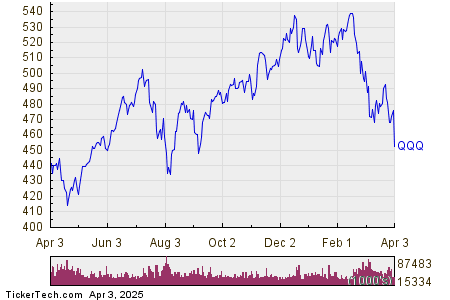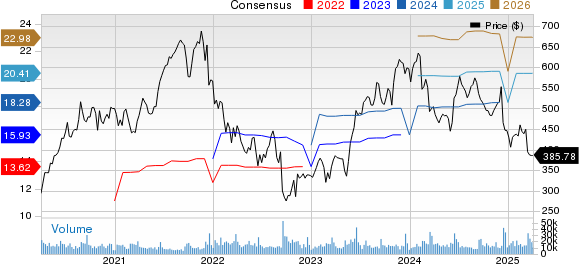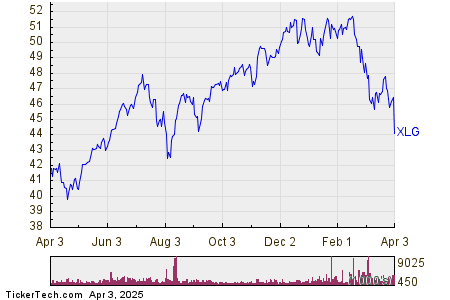Top AI Stocks to Buy Following Recent Market Pullback
Following a recent market pullback, many high-quality tech stocks in the artificial intelligence (AI) sector are trading at more attractive prices. Investors now have a timely opportunity to acquire shares in these leading companies.
Let’s examine two AI stocks worth buying and holding for the next decade.
Start Mornings Smarter! Get Breakfast news delivered to your inbox every market day. Sign Up For Free »
1. Alphabet
Best known for its Google search engine, Alphabet (NASDAQ: GOOGL) (NASDAQ: GOOG) boasts a diverse portfolio of businesses. Google dominates the search market, holding about a 90% global market share, and remains the largest digital advertising platform worldwide. Although competitors using AI technologies are emerging, none can match Google’s extensive user base and vast network of advertisers.
Alphabet also owns YouTube, which stands as the most viewed streaming service. As an independent entity, YouTube ranks as the fourth largest digital advertising platform globally. The company’s strategy of sharing ad revenue with creators effectively mitigates high upfront content costs and greatly enhances profitability.
Additionally, Alphabet is making significant investments in AI. The company operates the world’s third-largest cloud-computing platform, aiding clients in developing their own specialized AI models via its Vertex AI platform. This service allows customers to utilize foundational models like Gemini. Alphabet is also leveraging Gemini to enhance search results and drive its AI Overviews.
The development of AI Overviews may open new revenue streams. Historically, Google displayed ads in roughly 20% of its searches, primarily relying on cost-per-click as a major revenue source. However, Google has alternatives through AdSense, including display, text, and video ads, that could further monetize its AI Overviews. The company also operates the Gemini generative AI chatbot, which, despite lagging behind rivals, shows signs of improvement. Alphabet leads in certain AI fields, such as text-to-video conversion, where its Veo 2 platform has demonstrated notable success, thanks to its training on YouTube content.
Beyond these initiatives, Alphabet heads innovations in autonomous driving via its Waymo unit, currently the only U.S. company offering paid rides within this space. As customer comfort with the technology grows, Waymo is expanding into new cities and capturing market share in regions like San Francisco. Though Alphabet aims to lower the cost of its technology, it remains a frontrunner in this developing sector.
Looking further ahead, Alphabet is advancing in quantum computing with its Willow chip. Last year, the company achieved significant progress, tackling one of quantum computing’s major challenges—error reduction during scaling. Though commercial applications of quantum technology are still on the horizon, this showcases Alphabet’s commitment to being at the forefront of technological innovation. Innovating and adapting are essential qualities that transform a tech company into a lasting investment.

Image source: Getty Images.
2. Microsoft
Similar to Alphabet, Microsoft (NASDAQ: MSFT) features a collection of leading businesses with substantial AI involvement. Microsoft was among the early tech companies to embrace AI, making significant investments in OpenAI, the creator of ChatGPT, and forming a strategic partnership with the startup.
Microsoft’s incorporation of OpenAI’s AI models has propelled the growth of its cloud division, Azure. Azure provides clients with infrastructure to train their own AI models, alongside AI-enabled analytics, security, and management tools. Although they face capacity constraints, Microsoft is investing heavily in expanding its data centers to meet rising demand.
Moreover, Microsoft has integrated AI assistant copilots across its product line. Notably, its Microsoft 365 subscription service includes these copilots in its popular productivity tools like Word, Excel, and PowerPoint. With a subscription cost of $30 per month for enterprise users, the potential for growth in this segment is considerable. The company also introduced new AI security copilot agents, further expanding its AI market.
While Microsoft relies on OpenAI, it continues to innovate. Reports indicate that the company is developing in-house AI reasoning models and collaborating with other third-party models to reduce reliance on OpenAI. This strategy will enhance its flexibility and empower it to utilize internal models for enhancing its copilots in the future.
The partnership between Microsoft and OpenAI is set to continue through 2030. However, it is clear that Microsoft is already planning for the future by developing alternative AI model options.
In addition to AI in its core software offerings, Microsoft has created its first video game AI model, Muse, with the aim of accelerating game development and preserving classic games for modern hardware. The gaming sector, bolstered by Xbox and renowned studios like Activision Blizzard, represents a significant revenue stream for Microsoft. Observers will be keen to see how AI will enhance and transform their gaming experiences.
With continuing growth attributed to AI initiatives, Microsoft’s adaptability and forward-thinking approach render it an attractive long-term investment. Adapting to changing market dynamics, Microsoft successfully transitioned to a subscription model for its productivity software and has emerged as a frontrunner in the AI landscape.
Seize This Second Chance for Lucrative Investments
Have you ever felt like you missed out on investing in lucrative stocks? Now is your opportunity.
At rare times, our expert team issues a “Double Down” Stock recommendation on companies anticipated to surge. If you’re concerned that you may have missed your chance, this may be the ideal moment to invest before it’s too late. The returns illustrate the potential:
- Nvidia: if you invested $1,000 when we doubled down in 2009, you’d have $284,402!*
- Apple: if you invested $1,000 when we doubled down in 2008, you’d have $41,312!*
- Netflix: if you invested $1,000 when we doubled down in 2004, you’d have $503,617!*
Currently, we are issuing “Double Down” alerts for three outstanding companies, and this moment may not repeat soon.
Continue »
*Stock Advisor returns as of March 24, 2025
Suzanne Frey, an executive at Alphabet, is a member of The Motley Fool’s board of directors. Geoffrey Seiler has positions in Alphabet. The Motley Fool has positions in and endorses both Alphabet and Microsoft. The Motley Fool also recommends long January 2026 $395 calls and short January 2026 $405 calls on Microsoft. The Motley Fool has a disclosure policy.
The views and opinions expressed herein reflect the author’s perspective and do not necessarily represent those of Nasdaq, Inc.




